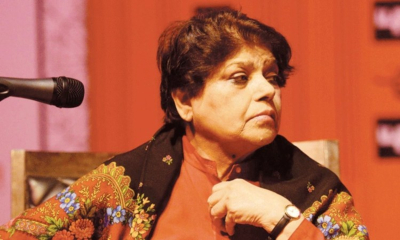Kishwar Naheed is one of the best known feminist poets of Pakistan. Born in Bulandshahr, Uttar Pradesh, India in 1940, her family moved to Lahore in Pakistan during the 1947 Partition of the sub-continent.
Kishwar had to fight to receive an education at a time when women did not go to school; she studied at home and obtained a high school diploma through correspondence courses, but went on to receive a masters degree in Economics from Punjab University.
Her first collection of poetry, Lab-i goya, published in 1968, won the prestigious Adamjee Prize of Literature. This collection of traditional ghazals was followed by a collection of nazms, by translations of foreign poetry, and by many works in free verse.
A nazm is a well organised, logically evolving poem where each individual verse serves the need of the central concept or theme of the poem. Though a nazm is traditionally written in rhymed verse, there are many examples of nazms written in unrhymed verse, or even in free verse.
A ghazal is a collection of couplets (shers or ashaar) which follow strict rules, for example: every ghazal must have a matla. A matla is the first sher of a ghazal, and both lines of the sher must end in the radeef, the word or phrase that is repeated at the end of the second line in every couplet.
Kishwar also writes for children and for the daily Jang, a national newspaper.
Her poetry has been translated into English and Spanish and her famous poem ‘We Sinful Women’ gave its title to a ground breaking anthology of contemporary Urdu feminist poetry translated and edited by Rukhsana Ahmad published in London by The Women’s Press in 1991.
Kishwar Naheed was Director General of Pakistan National Council of the Arts before her retirement; she edited a prestigious literary magazine called Mah-i naw; and she founded an organisation named Hawwa (Eve) whose goal is to help women without an independent income become financially independent through cottage industries and selling handicrafts.

